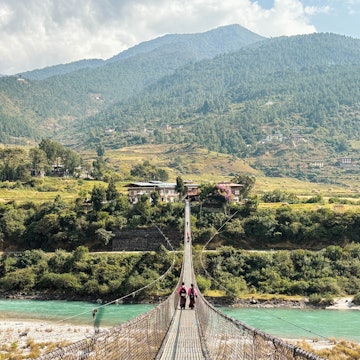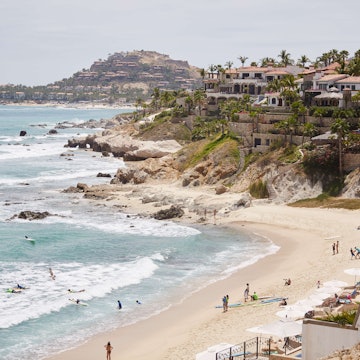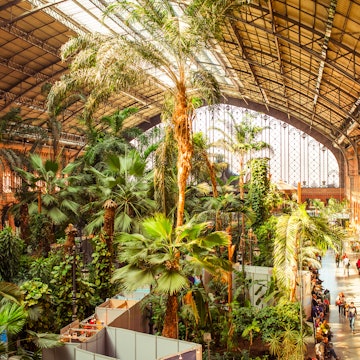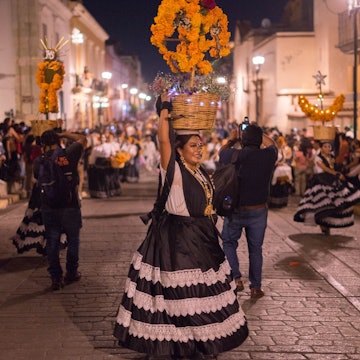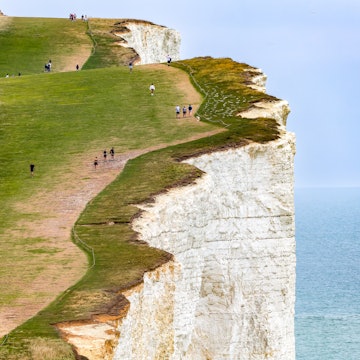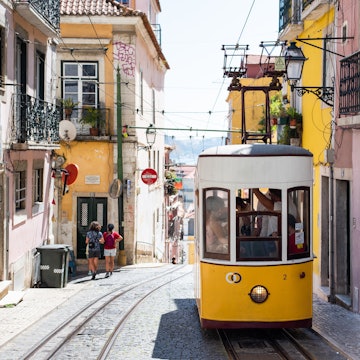
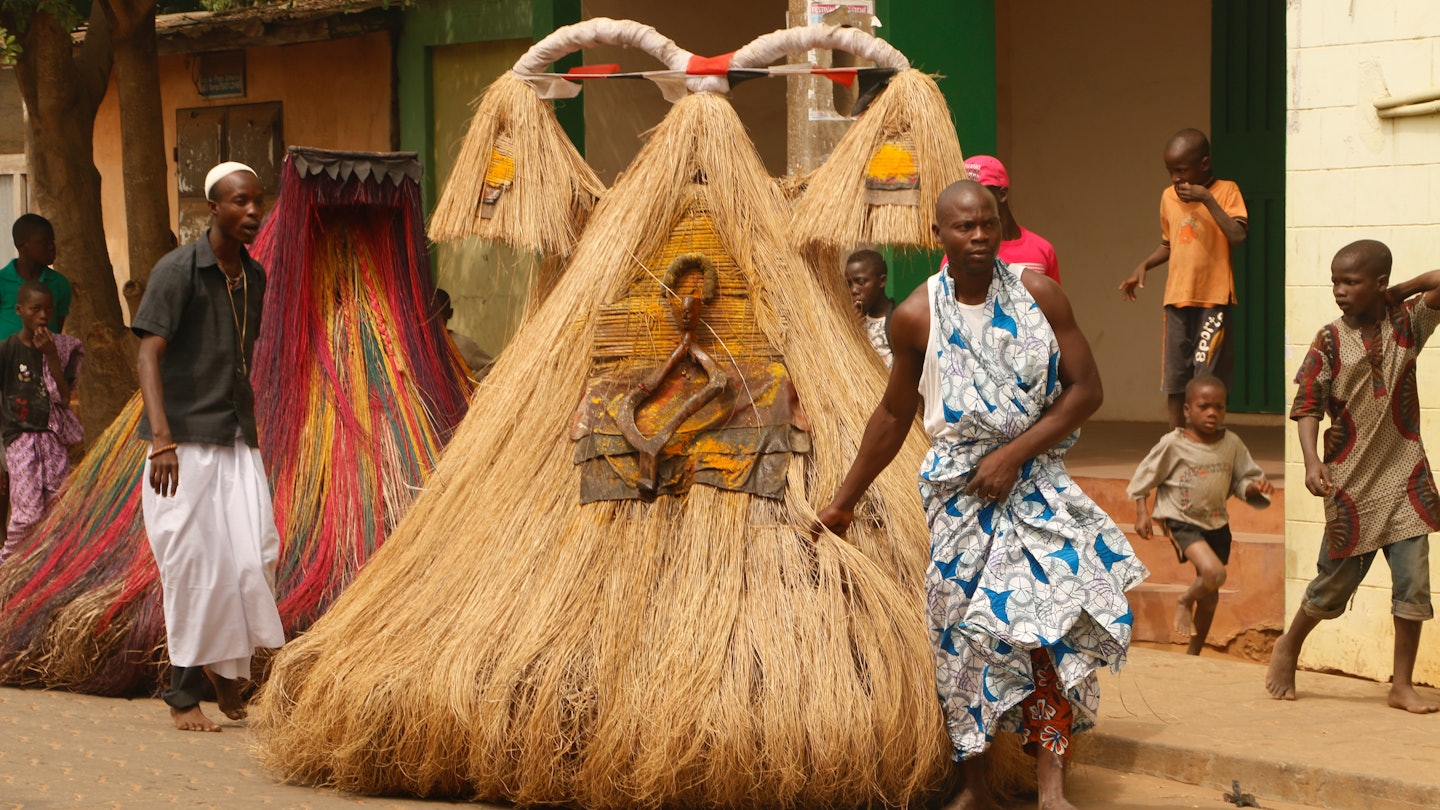
Vodou Day brings celebrations across Benin as everyone celebrates the national religion © Cora Unk Photo / Shutterstock
Benin is a small West African nation, proud member of the ECOWAS (Economic Community of West African States) and travelers often discover it alongside a trip to Togo.
Though it's not heavily touristed, visitor numbers are on the rise in Benin as word spreads about how much this welcoming nation has to offer. Every season gives you something new to experience, from major festivals to the ultimate relaxing beach break. And all of it while surrounded by Benin's incredible culture and people.
Choose the perfect season for your trip to Benin with our guide to what's happening and when.
December to February is the best time for hot weather and events
It may be the most expensive time of year to visit Benin, but that's only because there's so much happening. This is the season of merry and enjoyment as many West Africans call it. Christmas and the New Year are celebrated all over the African continent and Benin is no exception. The heat is at its most intense, reaching temperatures of 33C (91F).
The festivities begin with the International Festival of the Dahomean Cultures. This celebration is always at the end of the year and runs for 10 days in December – it highlights and celebrates the diverse cultures of Benin. Focused in the northern part of the country in Abomey, this event showcases traditional songs, dances, folklore and stories of the ancient Dahomey Kingdom as well as other tribes within the country.
The new year brings Vodou Day on January 10th, which is viewed in the same way as Christmas for Christians or Eid for Muslims as Benin is the birthplace of the Vodou religion. This public holiday attracts believers from all over Africa and the world to Ouidah to celebrate the often misunderstood and misinterpreted Vodou religion. The streets are filled with the sounds of drums as believers celebrate by dancing and drinking, and devotees assume the identities of gods with elaborate costumes and masks. Some ceremonies involve animal sacrifices (usually a chicken), which can be a shock to some visitors unfamiliar with the religion. Keep an open mind, be respectful and you'll have an incredibly unique travel experience.
One of the issues with Benin becoming an increasingly popular destination is the commercialization of some Vodou rituals and celebrations. Less authentic celebrations that are solely focused on tourists are not uncommon at this time of year and unscrupulous priests can unfortunately try to scam money from unsuspecting visitors. Keep your wits about you and move on if you feel uncomfortable.
The Quintessence Film Festival also kicks off in January and the city of Ouidah welcomes visitors from all over the world to join them in celebrating both local and international films. There is also a particular focus on African cinema from artists all over the continent.

March to May is the best time for low prices
This is a great time for less intense temperatures that make exploring the outdoors enjoyable – the average daily temperature is around 25C (77F). After all the buzz and excitement of the festivals in high season, Benin enters a period of restfulness. This also brings lower prices, so it's a great option for budget travelers. Enjoy some time on one of Benin's beautiful beaches and relax.
The Gelede Festival runs from March to May and is an enticing call for all travelers who believe in female empowerment. This festival pays respect to female elders and they are celebrated with ornate fashion, choreographed dances, singing, music and drumming, which is enjoyed by all members of the community.
The men wear large masks and walk around trying to amuse women. Pay a visit to the city of Cové, which is known for its vibrant public displays at this time. The entire festival is a glorious tribute to the matriarchs within the community who play a significant role in the community.
June to August is the best time for arts festivals
The wet season may bring sudden showers but Benin's tropical climate means you'll still have plenty of sunshine between the rainfall. This is a time that sees artists flock to the cities of Porto Novo and Cotonou for the Waba Festival – a recent initiative designed to promote the collaboration of artists across the country with an aim to popularize the artwork of Benin across Africa and the world.
It runs from the 5-9 of June and the best visual art in the country is displayed across multiple exhibits; the festival is focused on creating a healthy dialogue in the community about the role that everyone can play in popularizing and supporting Beninese artists. These exhibits are open to the public and are worth the visit. Accommodation prices tend to be lower at this time of year due to the weather – it's a great time to get more for your money if you don't mind the rain!
The port city of Cotonou is bustling and vibrant but also quite overwhelming if you've never been to Africa before. The colorful mix of commotion, noise and non-stop action is incredible but you may find hiring a guide makes it a much better experience on your first visit. They can bring you to all the best attractions and bridge the language barrier if you don't speak French.

September to November is the best time for a quiet beach break
This is the perfect time in Benin for a blissful beach holiday. The weather hasn't yet hit the highs of the dry season but the mercury still hovers around 27C (80F) and the crowds of peak tourist season have yet to arrive. You'll mostly have the beach to yourself and can get to know the local culture and people at a relaxed pace. Prices are also low, which makes it an excellent time for budget travelers in search of beautiful stretches of sand without a hefty price tag to match. Head to Grand-Popo, a quiet seaside town with a famed stretch of sand dotted with coconut palms.
Take your Benin trip with Lonely Planet Journeys
Time to book that trip to Benin
Lonely Planet Journeys takes you there with fully customizable trips to top destinations–all crafted by our local experts.

















